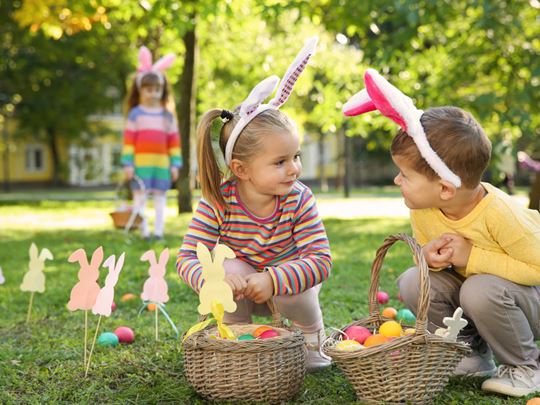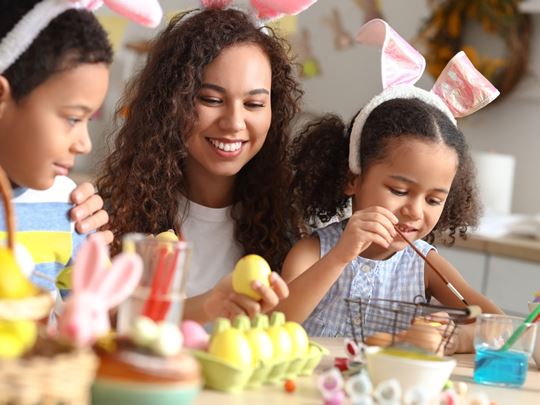Celebrating Easter with Your Foster Child
Here are some ways you can make Easter a positive experience for your foster child and the rest of your family.
7 ways to celebrate Easter with your Christian foster child
1. Share what Easter means to you
As a faith-based fostering agency, we carefully match Christian foster families with children of the same faith. This means you’re able to share more than just your home. You get to share your religion and lean on your faith to help you connect with a foster child and make them feel at home. As Easter approaches, you may want to talk to your foster child about what Easter means to your family and explore if there are any common traditions or activities that you’re both used to. It’s important to respect what your young person feels comfortable talking about, or how much they’re willing to engage, as they could have a shaky relationship with their faith after being taken into care. If you sense this is the case, you may want to ask what aspects of Easter they enjoy and which bits they could find uncomfortable, so you can make a plan based around this.
2. Attending Church
Going to Church will be a big thing for many Christian families, including those who foster. When you foster a Christian child, this could mean taking them to a Church they’re not used to. Some young people may be okay with this, whereas others could struggle or get anxiety around the thought of going to a different place of worship. In this instance, you’ll want to reassure them you’ll be there for them at all times, and perhaps even arrange an introduction with the parish priest to get them acquainted and alleviate any nerves. The delivery of service can differ between Churches, so giving them as much time to adjust before the main Easter service will benefit the whole family.

3. Easter crafts with children
As well as appreciating the message behind Easter, it’s also a time for fun games and crafts. You could give younger children a stuffed rabbit toy to decorate so they can have their own Easter bunny, whereas older children may prefer colouring in a picture of Jesus Christ. From painting to making handmade Easter baskets, there is always something you can make to add a bit of holiday décor to your home.
4. Decorating Easter eggs
It’s a traditional activity but it’s one that stands the test of time. Grab a regular box of eggs and let your foster child draw colourful patterns using markers and felt tip pens. You could then put them inside your homemade Easter basket to use as a centre piece for the dining table, for example.
5. Enjoy Easter lunch together
Easter Sunday is a time for Christian families to get together and celebrate rebirth and welcoming new life into the world. A big part of these celebrations involves Sunday lunch, usually involving lamb. It’s a good opportunity to teach your foster child about aspects of their faith they may not know about, such as why lamb is the traditional meat that’s eaten during Easter. Something to bear in mind though is that many children in care can have particular issues around food. A neglectful past can lead young ones to binge or hoard food out of not knowing when their next meal will be. Or perhaps they've not experienced many different food types and the thought of trying new things makes them anxious. Easter should be a positive experience for everyone, so don’t put pressure on them to eat the same lunch if they don’t want to. They could have their ‘safe’ food, such as pizza or chicken nuggets, but you could encourage them to have some of the vegetables you’re serving for the family, as a way for them to feel more included. At the end of the day, sitting together at the table and having quality time is more important than the food on your plates.
6. Go on an Easter egg hunt
This is a fun activity for children of all ages to enjoy. Using the eggs they coloured in before, you could hide these around the house and garden. Each egg could come with a treat, such as a chocolate or a pound coin. Or you could make it a competition for the whole family and have a prize for whoever collects the most eggs. This creates a sense of togetherness, which a lot of children in care haven’t experienced much of.
7. Plant some flowers
Flowers are widely associated with spring, and since spring is the season when Easter brings the promise of new life, it makes perfect sense to plant some flowers. Why not let your foster child help you choose the kind of flowers to plant and then let them help you plant them as well? It’s fun but also symbolic that you’re growing together as a foster family.
Could you foster a Christian child and give them the loving home they deserve? We’d love to hear from you, as we’re always looking for Christian families to open up their hearts and homes to Christian children in care. They need consistency and stability, and one way of providing that is through placing them into homes that share the same faith. So please, get in touch with our team today. They’re on hand to answer your questions and help you decide if fostering is the path for you.
Think you’re ready to foster?
Find out everything you need in order to become a foster parent, or feel free to get in touch with any questions






